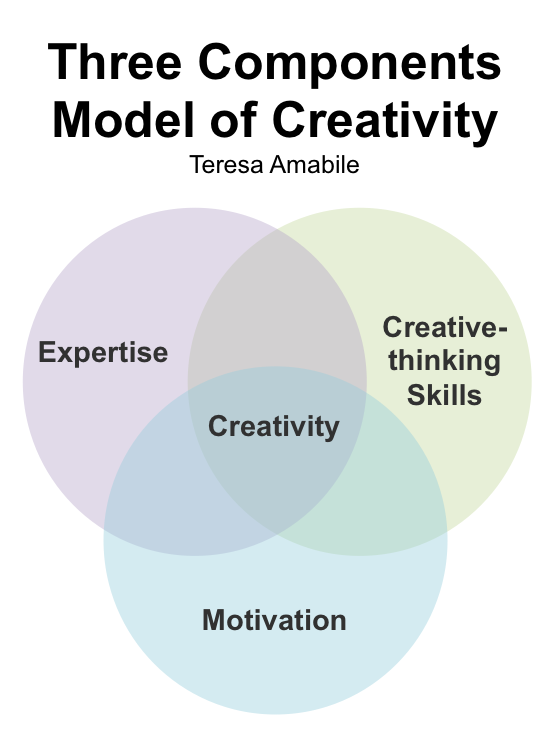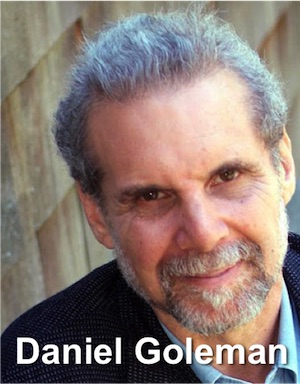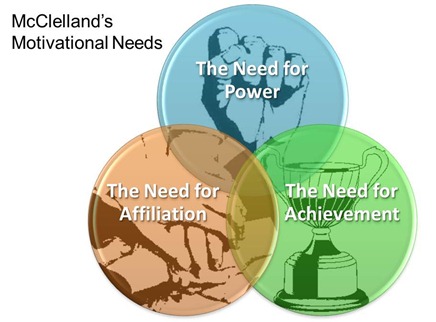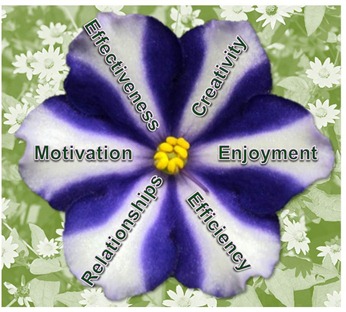The history of academic study of workplace motivation is full of simple accounts of what motivates us, from the ‘Hawthorne Effect‘ through the ‘Hierarchy of Needs‘ and McClelland’s ‘three needs‘ to ‘Self Determination Theory‘. Teresa Amabile has added a new, starkly simple account of what managers can do to motivate your people. And it is supported by a huge research base.

Short Biography
Teresa Amabile was born in 1950 and went Canisius College in western New York State, to study Chemistry. After graduating in 1972, she shifted direction and enrolled at Stanford University to take an MA in psychology, and stayed on to defend her PhD thesis in 1977.
She returned to the East coast to take up an academic post as Assistant Professor of Psychology at Brandeis, where she stayed until 1994, having become a full professor in 1990. There, she became an authority on creativity.
Her 1983 book, The Social Psychology of Creativity, republished in 1996 as Creativity in Context, is considered a classic research text for serious students. It reviews a wide and complex topic. Some of her own findings are most easily accessible in a 1998 Harvard Business Review article, called How to Kill Creativity, which is well-worth reading.
In 1995, she moved to Harvard to become the Edsel Bryant Ford Professor of Business Administration, a chair she continues to hold emerita. There, Amabile opened up a second, related front in her research, looking at motivation, mood, and our inner life, at work.
This led her to the research which gave her the prominence she enjoys today, and is fully covered in her 2011 book, ‘The Progress Principle: Using Small Wins to Ignite Joy, Engagement, and Creativity at Work‘, which she co-wrote with her husband, the psychologist Steven Kramer.
Creativity
Teresa Amabile sees creativity arising out of three components:
- Expertise, or knowledge in all its forms
- Motivation to solve a problem. Self-motivation (or ‘intrinsic‘ motivation) is far more important than external (‘extrinsic‘) motivation, which can even stifle creativity.
- Creative-thinking skills. Amabile asserts there is a capability here and she describes it in terms of flexibility, imagination and perseverance.

Managers can influence the development and deployment of these three components, and in her HBR article, Amabile lists six ways.
- Challenge
Managers need to provide tasks that challenge and stretch their employees, rather than allowing them to remain in their comfort zone. Notice how this relates to Csikszentmihalyi’s conditions for Flow. - Freedom
People thrive best when they are able to work independently on their assignments. This reflects one of the three components of Self Determination Theory: Autonomy. - Resources
We know constraints help creativity and time pressure boosts it too. But these are likely to do so by also increasing intrinsic motivation. Amabile finds that, without sufficient time and material resources, creativity is held back. - Work-group Features
Managers can create the local conditions for creativity by encouraging enthusiasm, mutual support and, vitally, a respect among team members for each others’ diverse abilities and contributions. - Supervisory Encouragement
In a finding that is mirrored by Amabile’s more recent work on inner work-life and motivation, she concludes that managers who encourage and praise team members get more creativity out of them. (Shock horror!) - Organisational Support
She argues that this goes further. A culture of creativity needs full-on organisational support behind that of the team’s immediate managers. People need to feel their creativity is valued and will open up opportunities.
The Progress Principle
Amabile’s most recent work into our ‘inner worklife‘ has caught the attention of the business press. Her findings show a complete conflict between what people think motivates them at work, and what actually leaves them feeling satisfied at the end of the day.
In questionnaires, Amabile found a very low self-assessment of the importance of making progress in overall mood and job satisfaction. But when she carefully analysed thousands of personal journal entries, she discovered that a sense of having made progress during the day offered the single greatest positive correlation to feeling good at the end of the day. And setbacks in work likewise had an adverse effect on end-of-the-day mood.
I can’t help thinking that David McClelland would hardly have been surprised that this is true of the people he described as having a high ‘Need for Achievement’. But Amabile showed that this applies to almost everyone. And this makes progress a very powerful and equally simple lever of motivation.
And… it is one that managers can easily manipulate. As a project manager, I have always advocated the use of more, rather than fewer, milestones on my projects. Each milestone is a point of recognition of progress. As a manager, you can set more progress indicators for your teams, and expect them to feel better about their work than if they had long periods between conspicuous successes.
There is far more to Amabile’s research than this. But she is an eloquent and clear speaker, so take a look at her describing the Progress Principle, in a 2011 TEDx talk, in Atlanta…
Teresa Amabile at TEDx
Here is Amabile speaking about the progress principle at TEDx, in 2011.




